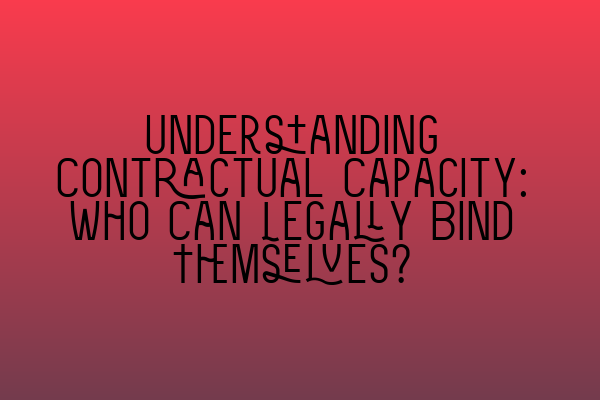Understanding Contractual Capacity: Who Can Legally Bind Themselves?
In contract law, the concept of contractual capacity refers to the legal ability of an individual or entity to enter into a valid contract. Contracts are the backbone of commercial transactions, and it is crucial to ensure that the parties involved have the requisite capacity to understand and enforce the terms of the agreement. Failure to have proper contractual capacity can render a contract void or voidable.
So, who exactly can legally bind themselves to a contract? Let’s delve deeper into the topic and explore the various aspects of contractual capacity.
1. Adults: Generally, all adults have the legal capacity to enter into contracts. The law assumes that individuals who have reached the age of majority (usually 18 years old) possess the mental capacity to comprehend the terms of a contract and the implications of their actions. However, it’s important to note that certain individuals may have limited capacity due to mental impairments or disabilities. In such cases, the law may require additional safeguards or impose restrictions on their ability to enter into contracts.
2. Minors: Minors, who are individuals below the age of majority, have limited contractual capacity. The law recognizes that minors may lack the necessary judgment and experience to fully understand the consequences of their contractual obligations. As a result, most contracts entered into by minors are considered voidable at the minor’s option. Nevertheless, there are exceptions to this general rule, such as contracts for necessities like food, clothing, and shelter, which are binding on minors.
3. Mentally Incapacitated Individuals: Individuals suffering from mental illnesses or incapacities may lack the necessary capacity to enter into contracts. In such cases, the law may consider their contracts void or voidable. It is essential to determine the extent of the mental incapacity and whether the individual had sufficient understanding of the contract’s terms at the time of entering into the agreement.
4. Corporations and Other Entities: Legal entities such as corporations, partnerships, and limited liability companies (LLCs) can enter into contracts on behalf of their organizations. These entities have their own legal personalities and operate independently from their owners or directors. When entering into contracts, it is crucial to ensure that the individuals signing on behalf of the entity have been duly authorized to do so and that the contract aligns with the entity’s objectives and legal requirements.
Understanding contractual capacity is vital to protect the integrity of contractual relationships. Whether you are an individual, a business owner, or a legal professional, it is essential to consider the following when dealing with contracts:
1. Verify the capacity: Before entering into a contract, it is important to ascertain the capacity of the parties involved. Understanding the legal capacity of the other party will help mitigate the risk of entering into an unenforceable or void contract.
2. Be cautious with minors: When dealing with minors, it is crucial to exercise extra caution. While contracts for necessities are generally binding on minors, it is advisable to seek legal advice to ensure compliance with the relevant laws and regulations.
3. Seek professional assistance: When entering into complex or high-stakes contracts, it is always advisable to seek legal advice from a qualified solicitor. A solicitor can help draft or review contracts, ensuring compliance with the law and protecting your rights and interests.
In conclusion, contractual capacity plays a crucial role in contract law. Understanding the capacity of the parties involved is vital to ensure the validity and enforceability of contracts. By having a clear understanding of who can legally bind themselves, individuals and businesses can navigate the world of contracts with confidence and protect their interests.
For more legal insights on contract law, you may find the following articles helpful:
– Exploring the Impact of Frustration on Contractual Obligations: Legal Insights
– Interpreting Contractual Clauses: Unlocking the Hidden Meanings
– Legal Aspects of Business Contracts: Key Considerations for Entrepreneurs
– Agreements in Contract Law: Understanding Its Various Types
– Essentials of Consideration: Understanding the Basis of Contractual Exchange
Remember, when it comes to contract law, knowledge is power. Stay informed and make sound decisions to protect your rights in the realm of contracts.
